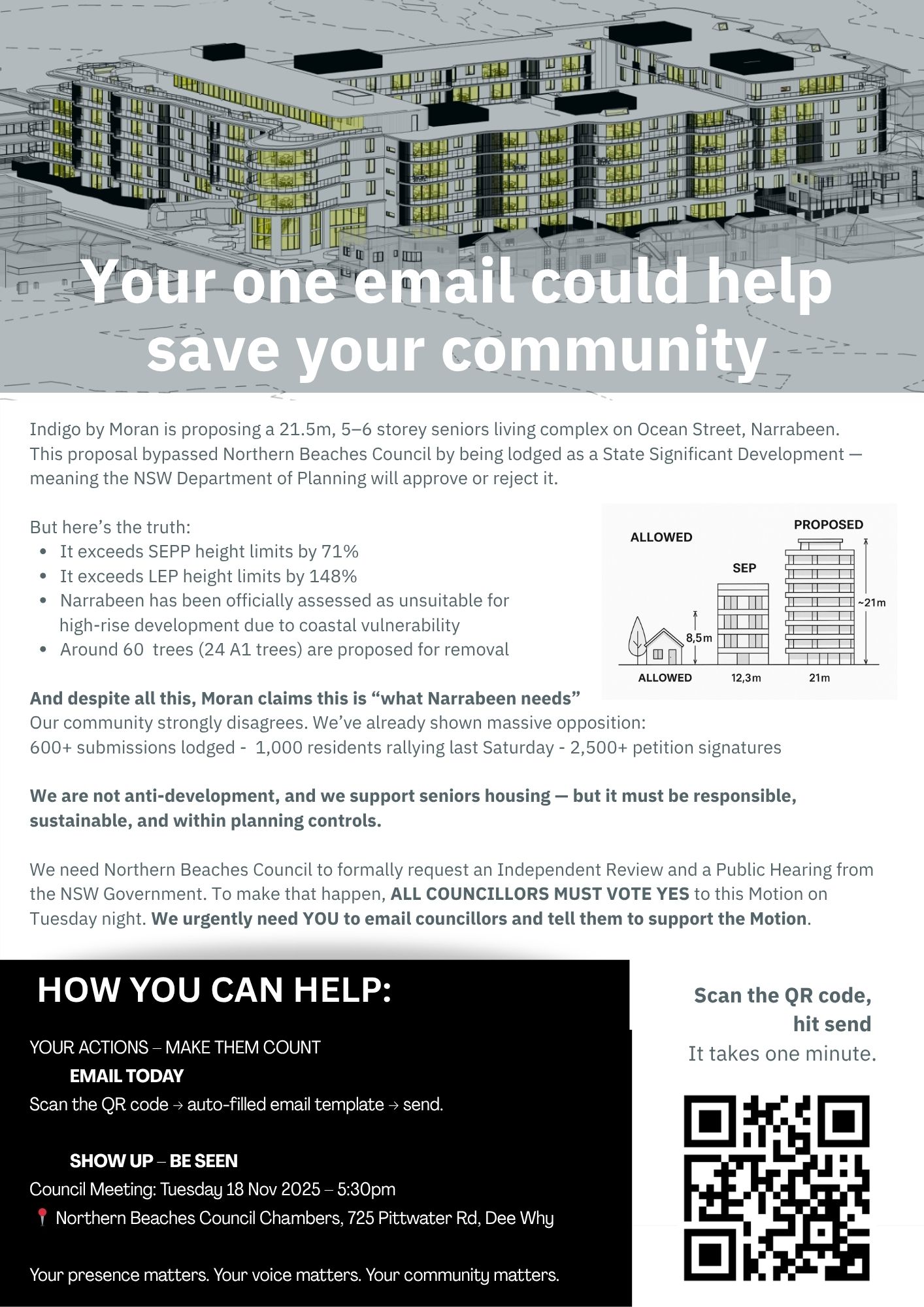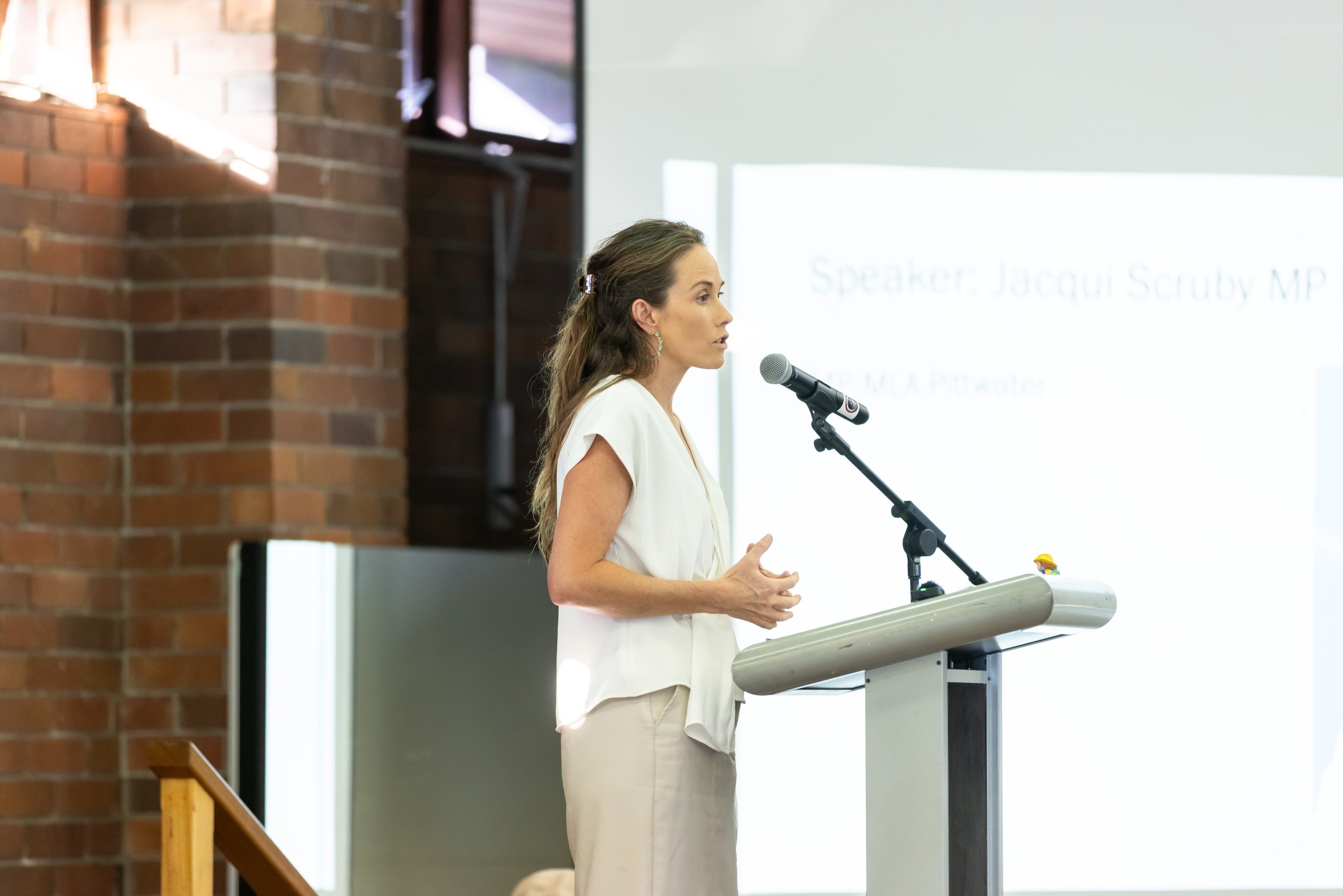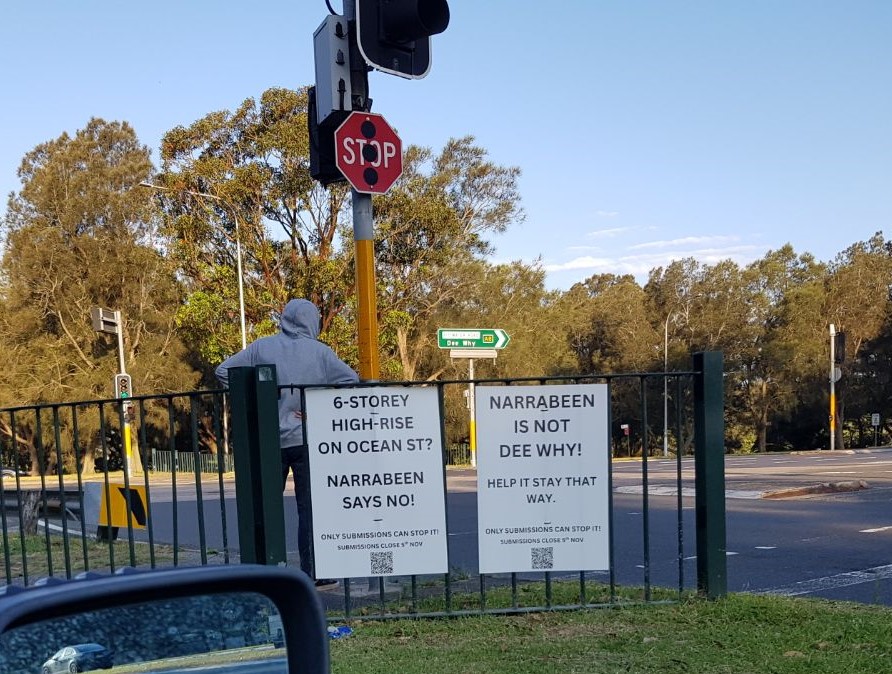Scruby slams government and opposition teaming up to make it easy for developers as NSW Planning System Reform Bill passes - community asks: who are these elected Representatives actually representing?
The Minns Labor Government’s Environmental Planning and Assessment Amendment (Planning System Reforms) Bill 2025 passed the upper house of the NSW Parliament on Tuesday November 11, Remembrance Day 2025, with the support of the opposition coalition, which means this Bill has now passed both houses.
The legislation is designed to cut red tape for developers and legislate targeted approval pathways such as the low to mid rise housing reforms.
“I am one of only four Legislative House members standing up against developer-led planning,” said Independent Member for Pittwater Jacqui Scruby MP.
.png?timestamp=1763204832365)
Ms Scruby successfully moved an amendment to protect native habitat as part of the objects to the act when the Bill was passing through the Legislative Assembly.
Wakehurst MP Michael Regan successfully moved an amendment to ensure protections and consent requirements for bushfire prone land were reinstated.
The original draft removed both of these - and this was supported by both Labor and the Coalition prior to these two local Independents moving these amendments.
“These reforms sought to water down nature protections - I ensured they were restored to conserve all native habitat, not just that inhabited by endangered species. That amendment is a win for Pittwater and a win for NSW,” said Ms Scruby.
“Both major parties are now pro-developer, pro-low to mid rise reforms - but protecting Pittwater means preserving our tree canopy, our character, avoiding construction in bushfire and flood zones, and upholding our local planning controls.”
Ms Scruby highlighted comments from Liberal Opposition members.
In the upper House Liberal Party Member Chris Rath stated during the debate ‘’ We are now a pro-supply, yimby-based party'' [and] ‘’getting government out of the way and letting developers build houses’’.
The speech prompted people to ask - 'just who are they representing as it's clearly not us.'
The comments, in essence, devolve the point of having a government or laws or politicians as representatives of their communities to begin with, and does not admit to where else the broad changes could apply - fast-tracked mining projects, cutting down the last few plants of an already critically endangered species or killing off the last of a near-extinct animal - along with by-passing councils, the voices of residents or ensuring the infrastructure needs large-scale developments would require are met by those who will profit from the same, not the communities they seek to place them in.
“The streamlining of planning approvals will increase the number of complying development certificates and we will also see an increase in state significant developments and rezoning, all of which reduce community input and usurp local planning controls as well as bringing corruption risk with the consolidation of power to the Development Coordination Authority and the Housing Delivery Authority,” Ms Scruby said.
“My office has been flooded with concerns in recent weeks. People can count on me to be their voice against developer driven development.
“At the weekend, I joined hundreds of local residents protesting at Indigo by Moran proposed development at Narrabeen, a State Significant Development application for retirement living which is in gross excess of both local and state planning controls.”#
“This is a State Significant Development that will create a huge change in the landscape of Ocean Street and surrounds as well as impact traffic, neighbourhood amenity, coastal planning and the character of Narrabeen.” Ms Scruby said.
See last week's report: Over the Top Narrabeen DA Draws Large Crowd to Peaceful Protest: 'This is about Community Standing up For Community'
And September 2025 report: State Government's Latest Planning system reforms set off Alarm Bells in Community, Local Government, Environment Groups
And February 2025 report: Mona Vale Set to Become Dee Why of Pittwater Under NSW Government's Low and Mid-Rise policy
You can watch Ms Scruby’s presenting her amendment to the Bill here.
You can watch Ms Scruby’s address to Parliament here.
You can view Ms Scruby’s Planning Community Forum (November 3) with James Farrington, Director of Planning and Place for the Council, attended by 140 people, here.
Pittwater MP Jacqui Scruby has also launched a petition - Oppose the Planning Reforms - available at: www.jacquiscruby.com.au/oppose_the_planning_reforms

The government states 'the passage of the Bill marks the most significant overhaul of the Environmental Planning and Assessment Act 1979 in a generation, modernising the foundational legislation of the state’s housing, jobs, infrastructure, and energy delivery'.
'For decades, the planning system has grown overly complex and slow, holding back the delivery of new homes, job creating investments and adding unnecessary costs and delays to the construction pipeline. These reforms will help clear the bottlenecks and make the system work for communities, councils, and builders alike.'
'The Bill introduces a suite of changes to streamline planning approvals, provide greater certainty for industry and communities, and cut unnecessary red tape, and has received widespread support through the NSW Parliament.' the government said
The government states the key reforms include:
- Establishing the Development Coordination Authority – a single front door for advice on major projects across NSW government agencies.
- Enshrining the Housing Delivery Authority in legislation to make sure there is an enduring, state-wide focus on housing delivery.
- Expanding Complying Development pathways to enable faster approvals for low-impact development.
- Introducing a new Targeted Assessment Pathway for developments already subject to strategic planning and community consultation.
- Amending the EP&A Act’s objects to include housing delivery, climate resilience and proportionality for the first time.
- Replacing more than 100 consultation plans with a single, state-wide Community Participation Plan.
- Removing unnecessary duplication, including regional planning panels and outdated assessment pathways.
'The Minns Labor Government has delivered the largest housing and planning reform agenda in the state’s history, including the Transport Oriented Development Program, Low and Mid-Rise Housing Policy, the Infill Affordable Housing Bonus, new Renewable Energy Planning Framework and the Investment Delivery Authority.' the government stated on Tuesday
'Together, these initiatives are designed to make it easier to build the homes and create the jobs that NSW needs, and support young people, families and key workers finding a home in the communities they love.
The Government will now work with industry, local Government and professional bodies on the implementation of the reforms.'
Premier of New South Wales Chris Minns said:
“The Bill’s passage represents a major step forward for NSW housing and planning reform.
“For too long, NSW has been held back by a system that was slow, complex and out of step with the necessity to deliver more homes for those who need them.
“These reforms will help us build more homes faster, in the right places, giving young people and families the chance to access a home.”
Minister for Planning and Public Spaces Paul Scully said:
“The overwhelming support of the parliament for the Bill demonstrates a shared commitment to tackling NSW’s housing challenges and enabling a modern economy.
“This does not mean that we will take our foot off the pedal. If anything, the real work starts now, and we will be working hard to see these reforms implemented.
“This Bill will enable a planning system fit for the 21st century, one that supports housing and energy delivery, encourages job creation, investment and builds better communities.
“I thank my parliamentary colleagues for recognising that reform was overdue and working constructively to help deliver it.”
The NSW Liberals state this reform began when the Leader of the Opposition Mark Speakman, Leader of the NSW Nationals Dugald Saunders, and Shadow Minister for Planning Scott Farlow wrote to the Premier and the Minister for Planning in December 2024 offering bipartisanship and cooperation to get meaningful reform done.
The NSW Liberals and Nationals stated they first tried to deliver changes like these back in 2013, when the Coalition’s Planning Bill 2013, introduced by then Minister for Planning Brad Hazzard, sought to simplify planning approvals, speed up housing supply, and create a more transparent system.
'That reform was blocked in the Upper House by Labor, the Greens and the Shooters Party, who teamed up to frustrate progress and run scare campaigns about overdevelopment. ' they said in an issued tatement
'The NSW Opposition welcomes this Bill 12 years later because housing supply matters, but it’s not enough to pass legislation. The real test will be delivering affordable homes in the right places, backed by schools, roads and public transport, with urgent addressing of record state government taxes and charges and ramping up the supply of skilled labour. '
Leader of the Opposition Mark Speakman said this is a reform that should have happened years ago.
“We offered bipartisanship last December because housing is too important for politics. Our priority is to make it easier for anyone to find a home, not harder through more red tape or delay,” Mr Speakman said.
NSW Nationals Leader Dugald Saunders said regional areas need fast-tracked solutions to help deliver on the demand they are seeing.
“Housing is in short supply across regional NSW and we need a system that supports the growth and prosperity of our towns and cities, along with the infrastructure to match,” Mr Saunders said.
Shadow Minister for Planning Scott Farlow said “We welcome the passage of the Bill, but the real measure will be delivery, homes on the ground, not headlines in a press release,”
Minns Government Fast Tracks Destruction as Planning Bill Passes: NSW Nature Conservation Council
The Nature Conservation Council of New South Wales (NCC), the state’s leading environmental organisation, stated it is alarmed at the passage of the Environmental Planning and Assessment Amendment (Planning System Reforms) Bill 2025, as it will set environmental protection in NSW back decades.
“This is a deeply regressive step. NSW is facing an extinction crisis and worsening climate disasters, yet the government’s response is to make it easier to destroy nature faster,” said NCC CEO Jacqui Mumford.
The Bill passed through Parliament with some amendments by independents, opposition and the government, including those noted by the NCC as;
- The objects of the Act were reinstated, they still include promoting ‘the social and economic welfare of the community and a better environment by the proper management, development and conservation of the State's natural and other resources’, and other mentions of protecting the environment were retained in the objects.
- A Joint Select Committee of Parliament is to be established to give oversight to the new Housing Delivery Authority.
- Protections and consent requirements for bushfire prone land were reinstated.
- Limited guardrails were placed on Targeted Assessment Developments (TADs) so that a development that is/would be a designated development cannot be declared a TAD.
''These amendments were a welcome improvement to the Bill. However, the Bill still contains significant changes to the planning system that will have lasting detrimental impacts on our environment and communities.'' the NCC stated
Legal experts warn that the reforms heighten corruption risks, erode transparency, and allow environmental and climate impacts to be sidelined.
Under the new TAD pathway, the Minister or Department can declare classes of development eligible for streamlined approval, that would prohibit consideration of environmental impacts, public interest or site suitability.
Despite assurances the changes were about speeding up housing delivery, Premier Chris Minns has admitted the mining and energy projects will also be given faster approvals.
Premier Minns told an audience at the Sydney Investment Summit, “We are in the process of making NSW the quickest, the easiest, the most direct state to develop and realise big projects in.”
“Being the quickest state to approve harmful projects is nothing to be proud of,” Ms Mumford said.
“This Bill is a gift to Minns’ developer and mining mates and is now a new front in the fight for environmental protection, as the impacts of this bill roll out.
“This is going to set environmental protection in planning decisions back decades. The latest state of the environment report was a stark warning about the decline of nature in this state, and this Bill will only worsen the destruction.
“NSW needs a planning system that protects our environment, not one that cuts it out of the equation. These changes prioritise developer profits over the health of our land, water and wildlife.”
NCC is calling on the government to consult broadly on the regulations and planning policies that will give effect to the Bill.
Narrabeen DA Update
On Sunday November 16, organisers f the rally in Narrabeen last Saturday November 8, said
''This is our last chance to fight for a reduction of this massive over-development. Although it has bypassed Local Council for approval or input, there is a Motion at the council meeting on Tuesday night for councillors to ask State Government for an Independent Review Panel and a Public Hearing.
Here is your chance to help - scan the QR code below to let our councillors and our planning minister know we want this motion passed.
This is not just about Narrabeen - this sets a precedent for all suburbs across NSW with planning reforms just released.
This is not about providing affordable housing, or affordable seniors living with no benefits for our community.''

At the Better Cities Initiative: Mona Vale public forum on housing and development in March this year, discussions revealed strong support for a more community-driven approach.
Jacqui Scruby, Independent MP for Pittwater said then:
“Both major parties have eroded the community’s perspective on planning laws. Deliberative democracy and having community thinking integrated into planning is really important. It cuts through populism. The process engages people in complex decisions, as well as the realities of planning. Bushfire risk, flooding risk and infrastructure constraints are all good reasons to ensure we’re not building in places that could people at risk.”

- New state government rules to increase Density in r2 + r3 zones go on exhibition for feedback this week - December 3 - 9, 2023: Issue 608 and
- State Government Planning changes for medium to high density triggers call to provide feedback: closes Friday February 23 - February 18 - 24, 2024: Issue 614
